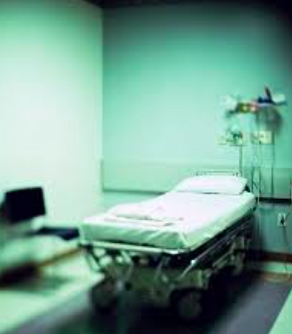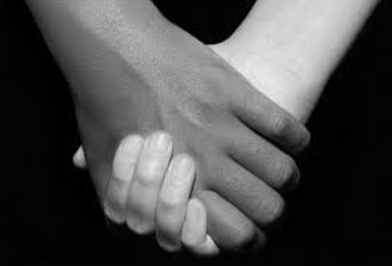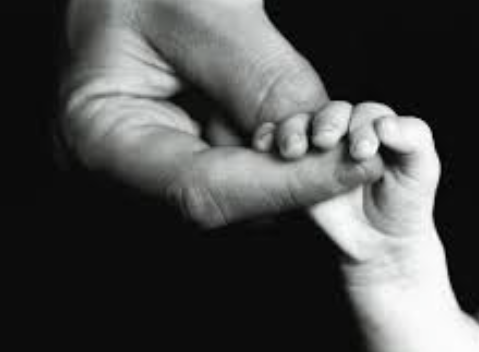on her last day on earth
It was a busy day in clinic on Thursday morning. There were people with Hepatitis B, bone infections, corneal ulcers, uterine fibroids and malaria. I also saw a 60-year-old woman who came to clinic with her son, because she'd had constipation for the past week. Her belly was also getting more and more distended.
I examined her. Her blood pressure was low, and her heart rate and respirations were fast. Her belly was taut and a little tender.
I sent her for an upright abdominal X-ray, which looked very abnormal.
I admitted her to the hospital and asked the surgical team to consult, thinking that maybe she had a bowel obstruction and needed surgery. If that was the case, she might be home in three or four days.
In the afternoon, the surgical team did more tests and found that the woman had metastatic cervical cancer. She had mets in her liver, and her whole belly was filled with cancer and fluid. They prescribed her diuretics to remove some of the fluid from her belly, as well as morphine and anti-nausea meds.

They told the family that the woman was beyond surgical help, and had a terminal diagnosis.
I was in clinic for the rest of the afternoon. My last patient of the day was an 18 year old girl who ended up having an ectopic pregnancy (where the fertilized egg implants in the Fallopian tube instead of in the uterus.)
The only treatment is surgery, so at 6 p.m., the surgeon and I took the girl to the O.R. to remove the Fallopian tube and ovary.
After we finished that case, it was nearly 7 p.m. We went to the community dining room to have dinner, and Allison, one of the hospital chaplains, was there. She was talking to one of the doctors about a patient and said that the patient wasn't expected to live through the night.
Then she turned to me. “I think you admitted her,” she said.
It was my lady with cervical cancer. She’d taken a turn for the worse and had began vomiting blood late in the afternoon. Her vitals dropped, and she was barely conscious.
I finished dinner and went back to the hospital.
The woman was lying in the bed half-conscious and clammy. There was dried blood around her mouth. Her son and daughter were there with her.
The woman had a Foley catheter in her bladder and an I.V. that was delivering fluids and pain medication. There was an oxygen saturation monitor clipped onto her finger.
But that was it. No oxygen mask, no blood pressure cuff, no blood transfusion, no monitor bells going off. There was nothing more to do, except keep her comfortable as she faded away.
Her heart rate was in the 140’s. Her oxygen went down to 82% while she was sleeping.
Her daughter kept trying to wake her mom up, calling her name, shaking her shoulders, dripping ice cold water into her mouth. She couldn't understand, let alone accept, that her mom and been walking and talking this morning, and by evening was nearly gone.
Her daughter looked like she was maybe 20 years old, which made me think my patient was younger than 60….but who knows. Ages are a soft science out here.
The patient and her son and daughter live 3 hours north of Mango, right on the border of Burkina Faso, and they spoke a Burkina dialect that no one in the hospital understood. So the chaplain called another chaplain who does speak that dialect.
He came in from home to talk to the family and to the patient.
The son and daughter were distraught. They had no idea when they brought her to the clinic that morning that by nightfall, she would be actively dying. I wanted to tell them that I was surprised as they were, but that didn’t seem helpful at the moment.
They said they wanted to take the woman home.
My heart sank.
Because here she was, lying in a bed in between clean, crisp white sheets with Phenergan to keep her from vomiting and Morphine to ease her pain. And I felt like maybe that was my only accomplishment for her — to make her comfortable for maybe the first time in her life. And they wanted to take that away.
I was also afraid that maybe they thought we had killed her. Maybe their mom came in not-too-sick and somehow we as a hospital had made her start to die.
The chaplain translated that the son and daughter were not mad at us; they were very appreciative of our care.
They wanted to take her home so their friends and family could say good-bye to the woman.
They also wanted to take her home because they had spent almost all their money one one day of care, and the 3-hour taxi ride would cheaper if she was still alive.
Taxis are allowed to transport dead bodies, but they charge 5-10 times as much because afterwards, they have to take their taxi to a marabou (a Muslim witchdoctor) and an Imam to remove the evil spirits.
The son and daughter and chaplains went outside to discuss it further, and to try to flag down a taxi.
The daughter motioned for me to stay with her mom. So I did.

I placed my hand on her clammy forehead and silently prayed for her. I felt an overwhelming spiritual peace and light in the room.
I prayed for her to experience joy and life and light on the other side of eternity.
Five, then ten, then fifteen minutes went by. The family was still outside with the chaplains. I was still alone at the woman’s bedside.
Her nurse came in. The family had decided to take her home, and asked that her Foley and I.V. be removed.
Her nurse lifted up the gown to pull the catheter out, and we saw that the woman was hemorrhaging blood from her rectum.
I helped her nurse wash her, change the sheets and put a new gown on her. Then her nurse left, and I was alone with the woman again.
Her oxygen was dropping. Flies crawled over her face and between her lips. I swatted them away.
By this point, I’d been standing at her bedside for an hour. It was 14 hours after I started clinic, plus I’d gone to the OR for the ectopic, and I was exhausted.
I pulled up a chair next to her bed. She got restless, threw the sheet off, and her right hand thrashed around. I gave her my right hand, and as she grabbed onto it, she settled down.
I didn’t know if she could hear me or not, but with my left hand on her forehead, I whispered, “Mama (the term of endearment for older women in Togo)." Her eyelids fluttered.
"Mama, you have been held in God’s love since the day you were born, and you are held in God’s love now.”
I blinked away tears as I traced the sign of the cross on her forehead with my thumb.
“Whenever you’re ready, you can go to God,” I said. “You can go home to God.”
I watched the monitor above her head, watching her heart rate and O2 saturation, wondering how long her poor body could keep up before it started giving out.
I thought about the women in the maternity ward just around the corner. Some of them were in labor for days, others for only a few hours.
Death was kind of like that. Some people took days to die, some people only a few hours. Or minutes.
And all we can do is stand on this side of the veil, on this side of eternity, and wait.

In birth, we receive souls into the world from God, and in death, we send them back to God, for his eternal keeping and his care.
Birth and death, and the life we live in between them, are inscrutable mysteries we will never fully understand.
But in the midst of the questions and the pain and the sorrow and the joy, we can rest in Love.
We are born in Love, we die into Love, and we are held in Love all the days of our lives.
***
note: The woman's family hired a taxi to take them home. She died on the way.
